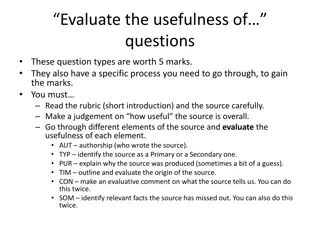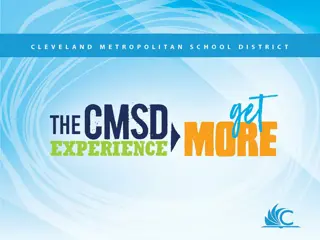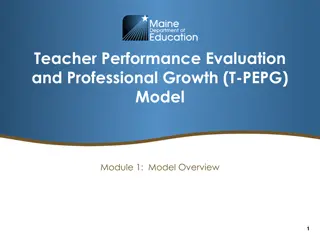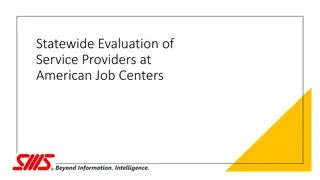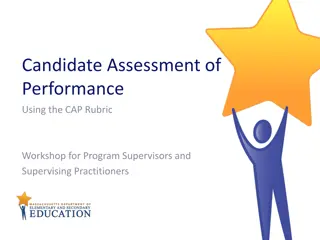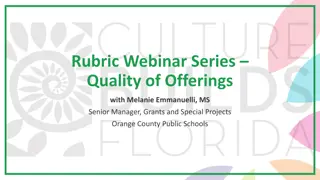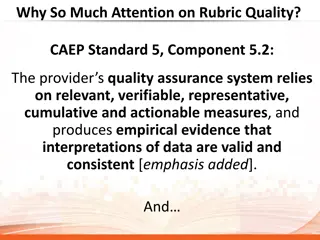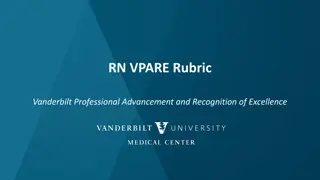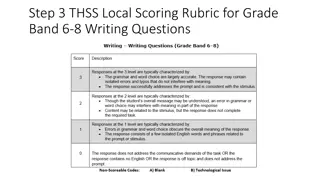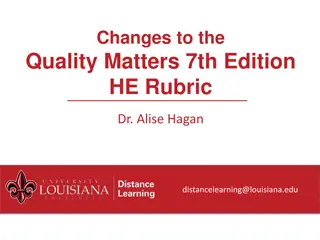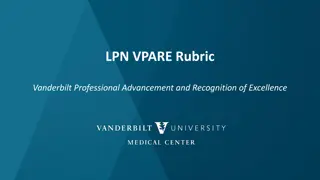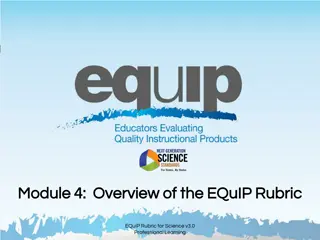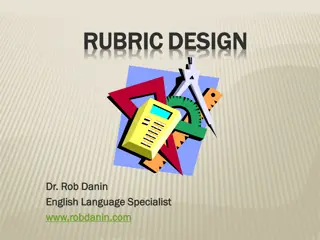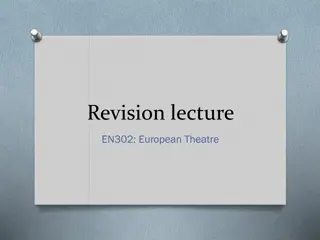Actions Emanating from the Evaluation of the Governance Reform
The evaluation of the governance reform within the WMO aimed to assess its alignment with strategic objectives, effectiveness in responding to societal needs, coordination efficiency, decision-making process, agility, and more. Evaluation criteria included relevance, design validity, effectiveness,
1 views • 13 slides
Comprehensive School Quality Assurance and Evaluation Process
A detailed insight into the Quality Assurance Department's role in school evaluation and improvement processes, including Whole School Evaluation (WSE), Follow-through initiatives, Teaching and Learning assessments, Resumption and Examination Monitoring. The process involves both internal self-evalu
0 views • 20 slides
Methods of Training Evaluation: Overview and Importance
Training and development are fast-growing fields globally, including in India. Evaluation plays a crucial role in understanding the effectiveness and efficiency of training programs for human resource development. This presentation covers the concept of training, evaluation strategies, methods/model
0 views • 61 slides
Universal Evaluation Framework: Simplifying Evaluation Processes
This session introduces the Universal Evaluation Framework (UEF) developed for evaluating QAA Scotland Enhancement Themes. Participants learn key evaluation questions, evidence capture, and the Theory of Change to enhance evaluation confidence. The QAA Scotland Evaluation Odyssey details historical
2 views • 14 slides
Implementing Blind Evaluation Pilot in HORIZON EUROPE: Key Facts and Process
HORIZON EUROPE is conducting a pilot on Blind Evaluation in the 2023-2024 work program to address biases in the research and innovation evaluation process. The pilot aims to assess the feasibility of blind evaluations in ensuring fairness and mitigating potential biases towards well-known organizati
9 views • 9 slides
Strengthening National Evaluation Capacity in the Era of Sustainable Development Goals
The presentation by Vijayalakshmi Vadivelu at the National Evaluation Capacities Conference 2017 in Istanbul focused on the importance of strengthening national evaluation capacity in alignment with the Sustainable Development Goals (SDGs). The content covers the holistic approach to national evalua
3 views • 18 slides
Exploring Developmental Evaluation for Better Decision-Making
Delve into the realm of developmental evaluation, focusing on its purpose, principles, and application in practice. Understand how developmental evaluation emphasizes real-time data collection for informed decision-making in complex systems. Learn about key principles such as developmental purpose,
0 views • 25 slides
Evaluation Practices in Macedonia: What Works, What Doesn't
The comparison between the effectiveness of evaluation practices and the presence of formal institutions in Macedonia raises questions about the impact of institutional design on outcomes. While some countries with robust evaluation institutions fall short in practice, others lacking such structures
1 views • 7 slides
Enhancing Evaluation Capabilities in Mongolia for Agenda 2030
The Mongolian Evaluation Network in collaboration with UNDP is working to integrate the 2030 Agenda into national strategies and plans, establish institutional coordination mechanisms, align budgets, and enhance data monitoring systems. Key stakeholders including government agencies, NGOs, and inter
0 views • 9 slides
Understanding Demi-Regularity in Realist Evaluation
Realist Evaluation is a theory-driven approach focusing on understanding the context and mechanisms of action behind policies and interventions. This webinar explores the concept of demi-regularity in realist evaluation, its origins, and its application in analyzing complex evidence. Key aspects cov
1 views • 16 slides
Understanding Evaluation in Education
Evaluation in education is a comprehensive term that encompasses measurement, testing, and qualitative examination of student behavior. It involves both quantitative and qualitative descriptions, along with value judgments. Differentiating from mere measurement, evaluation provides a deeper analysis
0 views • 28 slides
Sustainable Evaluation Systems Workshop Summary
Workshop on Sustainable Evaluation Systems by Stephen Porter at the NEC Conference focused on defining evaluation systems, addressing their failures, and emphasizing the importance of quality, use, and networks in achieving sustainability. Participants engaged in activities such as bingo card introd
0 views • 38 slides
Strategic Management: Strategy Review and Evaluation
This chapter delves into the critical process of strategy review, evaluation, and control in strategic management. It covers the nature of strategy evaluation, effective evaluation systems, contingency planning, auditing, using computers for evaluation, and guidelines for effective strategic managem
1 views • 42 slides
Evaluation of Source Usefulness through Multiple Criteria
In this evaluation task, you will assess the effectiveness of questions based on various criteria such as authorship, type of source, purpose, and relevance of information. By carefully analyzing the source content and rubric, you will provide an overall judgment on the source's utility while evalua
3 views • 10 slides
Understanding Evaluation and Ideology in Translation
Evaluation plays a crucial role in the study of translation, influencing both meaning and value in communication. This evaluation is reflected through language elements like accentuation, deletion, and substitution. Appraisal, stance, and evaluation are key terms in linguistic analysis that focus on
2 views • 22 slides
Impact and Evaluation Toolkit for Churches and Christian Charities
This toolkit aims to equip churches and Christian charities engaged in small-scale social action projects to think about impact, measure impact, choose data tools, reflect on evaluation data, and use it effectively. It covers principles of evaluation, setting objectives, selecting indicators, storyt
0 views • 34 slides
TDES Redesign Quarter 1 School Training Overview
In this training session facilitated for TDES School Team Members, participants will delve into the changes in the TDES system and rubric, understand HQSD evidence, PGP/PIP processes, and FAO procedures. The session also covers the changes to Article 13 of the CBA. Materials needed include the TDES
0 views • 47 slides
Evaluation Metrics for IEEE 802.11-14/0107 HEW Proposal
Evaluation metrics play a crucial role in assessing WLAN system performance and achieving the objectives of High Efficiency WLAN (HEW). This proposal by Yonggang Fang et al. from ZTE outlines the key evaluation metrics recommended for evaluating HEW performance, including area throughput, average th
0 views • 12 slides
Overview of Monitoring and Evaluation in the GEF
The Evaluation in the GEF and Training Module focuses on promoting accountability and learning within the Global Environment Facility (GEF) through monitoring and evaluation activities. The GEF Independent Evaluation Office plays a crucial role in assessing results, effectiveness, and performance of
0 views • 25 slides
Teacher Performance Evaluation and Professional Growth (T-PEPG) Model Overview
This training module provides an in-depth look at the Teacher Performance Evaluation and Professional Growth (T-PEPG) model, focusing on key features, structure, and terminology of the MSFE rubric. Participants will explore self-assessment, reflection, goal-setting, student learning objectives, evid
0 views • 40 slides
Statewide Evaluation of Service Providers at American Job Centers
The Statewide Evaluation of Service Providers at American Job Centers aims to assess the performance and capacity of service providers in delivering career and training services to WIOA Title 1 participants. The evaluation focuses on identifying strengths, weaknesses, and gaps in service provision,
0 views • 31 slides
Chile Country Portfolio Evaluation 2010-2014 Summary
Evaluation process of Chile's country portfolio from 2010-2014 included pre-evaluation, during evaluation, and results/conclusions phases. Challenges like defining scope and participant concerns were addressed. Preliminary conclusions were presented to stakeholders, leading to a trustful and represe
1 views • 6 slides
Candidate Assessment of Performance Using the CAP Rubric: Workshop Overview
This workshop conducted for program supervisors and supervising practitioners focuses on utilizing the CAP Rubric to assess candidate performance. The agenda includes warming up, learning about the CAP Rubric, understanding its goals and purposes, and detailing the CAP process. Participants engage i
0 views • 39 slides
Potential Amendments for Reforming REACH Evaluation Process
Discussion at the Ad-hoc Meeting of Competent Authorities for REACH and CLP focused on potential options for amending the REACH Regulation to reform the evaluation process. Topics included registration-related measures, substance evaluation, testing proposals, compliance checks, and expectations dur
0 views • 30 slides
Evaluation Criteria and Scoring Rubric for Arts and Culture Funding Applications
This document outlines the evaluation criteria and scoring rubric for funding applications in the arts and culture sector. It covers the quality of offerings, impact, track record, and other key aspects that will be assessed during the review process. Applicants must demonstrate the quality of their
0 views • 21 slides
Developing an Evaluation Work Plan for Effective Program Assessment
This presentation by Amy D. Andrade from San Jose State University focuses on developing an Evaluation Work Plan to identify responsibilities and timelines. It covers topics such as Evaluation Coaching Support, Webinar Outlines, Logic Model, Inputs-Outputs-Outcomes, Two Approaches to Evaluation, Pro
0 views • 29 slides
Music Classroom Participation Rubric and Procedures
This content provides a detailed music classroom participation rubric covering aspects like student behavior, time management, active involvement, and facilitating learning. Additionally, it outlines music room procedures including entering quietly, taking attendance, bathroom and water protocols, b
0 views • 5 slides
Evaluation Synthesis in Changing Contexts: Enhancing Knowledge for Development Effectiveness
Evaluation synthesis is crucial for promoting learning, reflection, and decision-making in development work. This process involves bringing together diverse knowledge sources to generate strategic insights and facilitate wider use of evaluation findings. The Independent Office of Evaluation of IFAD
0 views • 20 slides
Enhancing Rubric Quality in Educational Assessment
The focus on rubric quality in education, particularly in meeting CAEP Standard 5, Component 5.2 for quality assurance systems, is crucial for generating valid, reliable, and actionable data. CAEP now allows early submission of assessment instruments to improve data quality. However, common weakness
0 views • 22 slides
Evaluation of FME Zero Emission Neighbourhoods in Smart Cities
The mid-term evaluation process of FME Zero Emission Neighbourhoods in Smart Cities involves self-evaluation, partner evaluation, and panel evaluation. The procedure includes scientific review, evaluation by scholars, and innovation assessment. Key documents like self-reports, progress reports, and
1 views • 20 slides
Overview of Regular Evaluation 2017 Findings in Estonia
In the Regular Evaluation 2017, efforts were made to maximize the benefits of evaluation outcomes for various stakeholders in Estonia such as the state, society, and institutions. The evaluation focused on a range of actions including preparing legislation, finding experts, creating self-report form
0 views • 6 slides
LPN Evaluation Process Overview & Training Details
Training details for the LPN Evaluation Process in November 2022, with an agenda covering the new LPN rubric, accessing the portal, evaluation processes for paraprofessionals/LPNs, and event deadlines. The process includes submitting evidence, self-evaluations, conferences, and composite events for
0 views • 39 slides
Vanderbilt Nursing Professional Advancement Rubric
Vanderbilt Nursing Professional Advancement Rubric outlines criteria and expectations for nurses to excel in various leadership, empowerment, knowledge, and practice areas. The rubric covers aspects like transformational leadership, structural empowerment, new knowledge acquisition, and exemplary pr
0 views • 55 slides
THSS Local Scoring Rubric for 6-8 Grade Band Writing Questions
The THSS Local Scoring Rubric provides guidelines for grading writing questions in grades 6-8. Students are required to craft questions for a visiting journalist, ensuring they are complete sentences. The example responses showcase a range of student engagement and language proficiency levels.
0 views • 10 slides
Updates to Quality Matters 7th Edition Higher Education Rubric
Quality Matters (QM) has made significant updates to its 7th Edition Higher Education Rubric, including changes to point values, specific review standards, course resources, and overall wording. The new rubric emphasizes creating welcoming and inclusive courses, with key changes in terminology and a
0 views • 20 slides
Vanderbilt Nursing Professional Development Rubric
The Vanderbilt Nursing Professional Development Rubric outlines key areas of excellence and recognition criteria for nurses to advance in their careers. It covers transformational leadership, structural empowerment, new knowledge acquisition, and exemplary professional practice. The rubric encompass
0 views • 56 slides
Comprehensive Guide to Training Evaluation Methods
This detailed guide covers the aim of evaluation, evaluation methods, techniques of evaluation, types of evaluation (formative, process, outcome, impact), and the significance of formative and process evaluation in assessing training effectiveness. Learn about the key principles and practices involv
0 views • 45 slides
Understanding the EQuIP Rubric for Science: A Comprehensive Overview
Delve into the EQuIP Rubric for Science v3.0, exploring its development, structure, history, and key points. Learn about its purposes and objectives, including reviewing lessons, providing feedback, identifying exemplars, and informing new lesson development. Discover the three-category structure of
0 views • 12 slides
Mastering Rubric Design for Effective Assessment
Rubrics are essential tools in evaluating and providing feedback on student performance. This comprehensive guide covers the definition, elements, and benefits of rubrics, along with expert tips on designing impactful rubrics for various assessments. Explore the art of rubric design, learn what make
0 views • 30 slides
Exam Rubric and Guidelines for European Theatre Module
The content discusses important information regarding the exam rubric for the European Theatre module, including guidelines on time limits, permitted topics, penalties for violations, and advice on handling exam questions. It clarifies rules on writing about the same texts as in coursework essays, s
0 views • 29 slides













